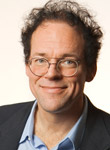Infrastructure investments could help resolve recession
By Caroline Shin

What would you do with a $200 check from a tax cut?
For the millions of Americans who took out mortgages over the past 10 to 15 years, or borrowed against the inflated values of their homes, the check would likely be used to chip away at debt rather than boost employment -- and growth -- inducing consumption expenditure, said Cornell professor of law Robert Hockett, speaking to members of the media in New York City April 10.
Consumption, Hockett said, would keep riding at low levels and thus continue to feed into the "stubborn persistence of the still ongoing economic slump."
Hockett, who serves as a consultant to the New York Federal Reserve Bank and has consulted for the International Monetary Fund, discussed the upcoming presidential election and the U.S. budget plan hinging on its outcome at an Inside Cornell media event.
Citing the principle of economic counter-cyclicality, Hockett said federal and state governments must adopt austerity policies during boom times like the early 2000s and stimulate the economy during bust times like the present. And in the latter case, he said, they must employ measures more significant than tax cuts, which are merely "frittered away" during downturns.
He pointed to the nation's deteriorating infrastructure as one significant place to focus on. "We need a real, serious infrastructure investment," Hockett said, pointing to an American Society of Civil Engineers' estimate that the cost to repair the nation's infrastructure has grown to $2.2 trillion. Most infrastructure projects, he said, would last five to seven years and create high-level, well-paid employment opportunities.
"It's not a flash in the pan sort of thing," Hockett said, noting that $1 trillion has already been earmarked by the states and another $1.2 trillion in infrastructure repairs has been proposed by U.S. Congressman Brian Higgins (D-N.Y.).
On debt reduction, Hockett proposed that municipalities exercise eminent domain authority and buy back underwater mortgage loans from creditors to write debt down to market value and allow mortgagors to pay their mortgages and keep their homes.
In a side conversation, Hockett called the recent emergence of Super PACs "abusive of the democratic process and accordingly disgusting." He proposed free use of the public airwaves for serious presidential candidates -- those who have garnered a threshold number of petition signatures.
And on the Dodd-Frank Wall Street Reform and Consumer Protection Act, Hockett said that while it's still too early to see the results, "I'm quite impressed by the promise it offers. ... I still hold out some hope."
Inside Cornell is a monthly series of interviews featuring high-interest experts from Cornell who discus important issues with members of the media in New York City.
Caroline Shin is a freelance writer in New York City.
Media Contact
Get Cornell news delivered right to your inbox.
Subscribe